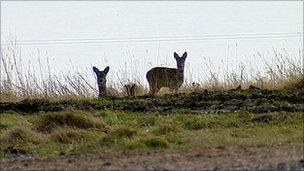Drivers warned over road deer menace
- Published

The signs will appear along routes with higher rates of deer-vehicle collisions
Motorists are being warned to watch out for deer on Scotland's roads.
Scottish Natural Heritage (SNH) said crashes involving deer tended to peak between late April and mid-May as young roe deer ventured out on their own for the first time.
Transport Scotland estimate that more than 10,000 deer-related road accidents happen every year, resulting in dozens of people being injured.
The economic cost of the accidents is put at about £5m a year.
Signs warning of the risks are being placed on routes across Scotland where there is a record of collisions.
They include the M90, A9, A90, M8, M77, A80, M80, A1 and A720, as well as other routes around Glasgow, Edinburgh, Stirling, Perth, Dundee and Aberdeen.
'Ideal habitats'
Deer management officer with SNH, Jamie Hammond, said: "The number of deer is increasing in some parts of Scotland, particularly in the central belt and around our towns and cities as more green space and woodlands are created.
"These provide ideal habitats for roe deer, leading to more accidents.
"Because of this, I'd advise drivers to be more aware than ever of the risks of deer on our roads.
"Many people think most accidents with deer occur on remote Highland roads, but more and more this is something we should be aware of around urban areas."
SNH advice to drivers:
Try not to suddenly swerve to avoid hitting a deer. A collision into oncoming traffic could be even worse.
Only break sharply and stop if there is no danger of being hit by following traffic. Try to come to a stop as far away from the animals as possible to allow them to leave the roadside without panic, and use your hazard warning lights.
After dark, use full-beams when there is no oncoming traffic, as this will illuminate the eyes of deer on or near a roadway and give you more time to react. But dim your headlights when you see a deer or other animal on the road so you don't startle it.
Report any deer-vehicle collisions to the police, who will contact the local person who can best help with an injured deer at the roadside. Do not approach an injured deer yourself - it may be dangerous.